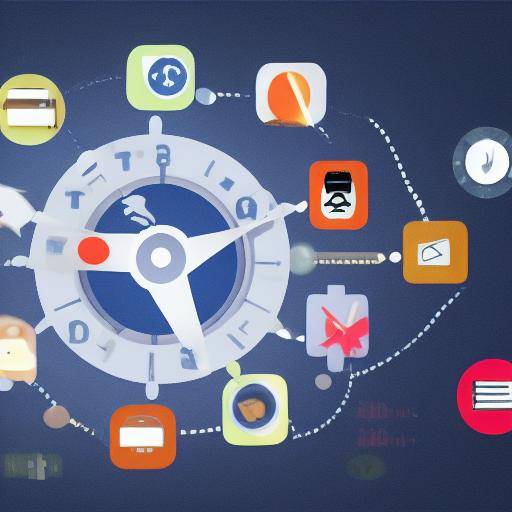
The concept of time management and its impact on burnout prevention has become relevant today, especially in a world where productivity and labour well-being are fundamental aspects. Understanding how time management influences burnout prevention and increased productivity is essential for individuals and organizations. In this article, we will explore in depth the impact of time management on burnout prevention, as well as its relation to productivity. From its historical origin to its practical application, we will analyze each aspect with the aim of providing a complete and practical view of these topics.
Introduction
Time management is a concept that encompasses various strategies and techniques aimed at optimizing the use of time to achieve greater efficiency and satisfaction at both the personal and professional levels. In turn, burnout, or occupational wear syndrome, is a phenomenon that results from prolonged exposure to chronic labor stress. Its impact is significant, not only at the individual level, but also in the labour and social spheres. Understanding time management as a tool to prevent burnout and boost productivity is crucial in finding a healthy balance between work and personal life.
History and Background
Origins of time management
The concept of time management has its roots in ancient Greek civilization, where the notion of time as a limited resource began to grow. Since then, various philosophical currents and movements of thought have explored and reflected on the importance of managing time effectively.
Time management acquired relevance in the labour sphere during the Industrial Revolution, when the organization of work and efficiency in production became fundamental pillars of industrial development. From that moment on, time management has evolved in the hands of technological advances, administration theories and organizational psychology.
Development of burnout concept
The term "burnout" was coined by psychologist Herbert Freudenberger in the early 1970s to describe the emotional exhaustion and lack of motivation experienced by mental health professionals. Since then, the concept has transcended the sanitary sphere to cover various labour sectors, becoming a topic of growing interest in the field of organizational psychology.
Analysis in Deep
Benefits of proper time management
Effective time management brings multiple benefits both individually and organizationally. It allows people to prioritize tasks, reduce stress, increase productivity and find a healthy balance between work and personal life. At the business level, efficient time management can result in greater operational efficiency, lower costs and better satisfaction of both employees and customers.
Challenges inherent in time management
Despite the benefits involved, time management also presents challenges. Inadequate time management can lead to procrastination, lack of focus and overload of tasks, which in turn can generate stress and decrease the quality of life. It is essential to identify and overcome these obstacles to maximize the benefits of efficient time management.
The impact of burnout on productivity
Burnout is manifested through physical, emotional and cognitive symptoms that affect quality of life and performance. While the impact of burnout varies according to the individual, its influence on productivity and well-being in the workplace is undeniable. Reducing performance, increasing labour absenteeism and reducing labour satisfaction are some of the direct consequences of burnout.
Comprehensive review
Practical applications of time management
Time management is materialized through various techniques and practical tools that allow the organization and execution of tasks to be optimized. Establish clear goals, prioritize activities, delegate responsibilities and use planning tools are just some of the strategies used to manage time effectively.
Best Practices to Prevent Burnout
The prevention of burnout involves the adoption of strategies at the individual and organizational level. Promoting a working environment that promotes the balance between work and personal life, implementing emotional support programs and facilitating the development of coping skills are some of the effective practices to prevent burnout.
Contrary perspectives on time management
Time management has been addressed from various theoretical perspectives, ranging from more structured and rigorous approaches to those that promote flexibility and adaptability. Understanding the various perspectives on time management allows individuals and organizations to select the strategy that best fits their specific needs and contexts.
Comparative analysis
Comparison between time management and productivity
While time management and productivity are closely related, it is important to distinguish between both. While time management focuses on how the hours of the day are used, productivity refers to the efficiency with which the tasks are performed. However, effective time management is a determining factor in improving productivity in a working environment.
Synergies between time management and burnout prevention
By integrating time management strategies with burnout prevention, it is possible to create synergies that contribute to emotional well-being and productivity. Establish clear limits, encourage rest and disconnection, and promote an organizational culture that values the balance between working and personal life are actions that can strengthen burnout prevention.
Practical Tips and Recommendations
Tips for Effective Time Management
- Prioritize tasks according to their importance and urgency.
- Use planning tools such as schedules or time management applications.
- Establish times of rest to avoid fatigue and exhaustion.
Strategies to prevent burnout at work
- Promote a working environment that promotes the balance between work and personal life.
- Implement active breaks to reduce stress and increase concentration.
- Providing emotional support programs and coping skills development.
Perceptions of Industry and Expert Reviews
Perspectives of time management experts and burnout
We talked with time management and work health experts to get their opinions on the interaction between the two topics. Their perceptions highlight the importance of addressing time management as a relevant factor in the prevention of burnout and the promotion of healthy and productive working environments.
Future Trends and Predictions
The future of time management and burnout prevention aims at integrating more holistic and personalized approaches, which consider not only efficiency in job performance, but also emotional well-being and quality of life. Technology will play a crucial role in developing innovative tools that support time management and burnout prevention.
Conclusions
In conclusion, time management plays a key role in preventing burnout and increasing productivity, both individually and organizationally. In understanding the interrelationships between these elements and adopting effective strategies, it is possible to promote healthy and sustainable working environments. Time management not only translates into efficiency, but also contributes to the integral well-being of people in their working environment.
Frequently asked questions
What are the main causes of burnout in the workplace?
Burnout can be triggered by a combination of factors, including overload of work, lack of control over tasks, lack of social and emotional support, and discrepancy between personal values and the working environment. Identifying and addressing these causes is critical to preventing emotional exhaustion and demotivation at work.
How can I improve my time management at work?
To improve time management at work, it is advisable to set clear priorities, use planning tools and delegate tasks when necessary. In addition, it is important to establish healthy limits, take regular breaks and practice digital disconnection to avoid fatigue and excessive fatigue.
What is the relationship between time management and work efficiency?
Efficient time management contributes significantly to labour efficiency by allowing prioritization of tasks, reducing time lost in non-productive activities and fostering a more organized and focused working environment. The ability to manage time effectively results in greater efficiency in the execution of tasks and the optimization of resources.
Can time management influence the quality of work life?
Yes, proper time management can significantly influence the quality of work life by reducing stress, increasing the sense of control over tasks and promoting a healthy balance between work and personal life. By managing time effectively, people can experience greater labor and emotional satisfaction, which contributes to their integral well-being.
What are the early warning signs of a possible burnout?
Early warning signs of a possible burnout include constant fatigue, lack of motivation, irritability, decreased labor performance, apathy towards labor and physical, and emotional responsibilities. Recognizing these early signals is essential to take preventive action and seek the necessary support.
What measures can a company take to prevent burnout among its employees?
Companies can implement preventive measures such as promoting the balance between work and personal life, providing emotional support programs, establishing digital disconnecting policies, fostering a positive working environment and providing personal and professional development opportunities. These actions can contribute significantly to the prevention of burnout among employees.
Conclusion
Time management, burnout prevention and productivity promotion are intrinsically related and play a key role in emotional health and work performance. In understanding the importance of managing time effectively, preventing labour exhaustion and promoting healthy working environments, it is possible to foster a more productive, satisfactory and sustainable working environment for all involved.






















































